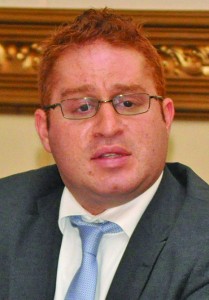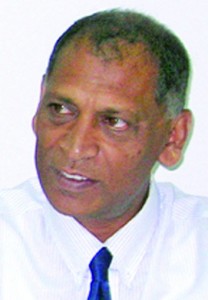– Dr Ramsammy says search on for suitable site
BY SVETLANA MARSHALL

Anthony Sabga III
Government has denied reports that ANSA McAL has suspended altogether its proposed multimillion-dollar bio-fuel project in Guyana, insisting that while the Trinidadian conglomerate has turned its back on the 40,000 hectares of land in the Canje Basin, the administration was still searching for suitable alternatives.
ANSA McAL’s Chief Executive Officer Anthony Sabga III, during a recent interview in another section of the media, said a feasibility study conducted in the Canje Basin indicated that the soil was unsuitable for the US$ 300 million ethanol project and rainy conditions proved the area useless.
But during an exclusive interview with Guyana Times International, Agriculture Minister Dr Leslie Ramsammy said the ANSA McAL multi-million dollar project is still on the table.
He explained that the Trinidadian group of companies had requested a change of location from the Canje Basin to the Intermediate Savannahs.
Location
According to Dr Leslie Ramsammy, a proposal was made in keeping with the recommended location but this too was overturned by ANSA McAL. Though the company’s rejection has caused some delay in the materialisation of the project, the government remains optimistic that it will be able to meet the demands of the company.
ANSA McAL requires a specific amount of land with special characteristics. “For example, a river port, this is quite an understandable request, I believe that it is still possible for us to accommodate ANSA McAL and so I am working closely with the Ministry of Natural Resources and the Environment to find a solution,” he posited.
It was explained that the Natural Resources and the Environment Ministry is evaluating the geographical land mass in the Intermediate Savannahs to determine whether the company’s specifics can be met.
If the Natural Resources Ministry comes up empty handed, only then ANSA McAL will have no other option than to scrap the project, the minister said.

Dr Leslie Ramsammy
Meanwhile, Dr Ramsammy said there is a high demand for land in the Canje Basin and the Intermediate Savannahs with investors collectively demanding more than two million hectares of land to facilitate large scale biomass production.
Foreign investors
From a batch of more than 15 foreign investors, the Agriculture Ministry has signed Memorandum of Understandings (MoUs) with just four group investors, hence, paving the way for feasibility studies to be conducted in the Canje Basin and the Intermediate Savannahs for the production of bio-fuel through the planting of sugar cane, palm and soya.
A group of investors from Malaysia and China recently signed MoUs with the Agriculture Ministry. The agreement was inked approximately two weeks ago to determine whether the Canje Basin is suitable for the planting of palm trees.
The group of investors is aiming to tap into the global market through the sale of palm oil to meet the growing demand.
Palmoil is not only used for cooking but for the production of fuel and creation of cosmetics.
In addition to the China-Malaysian group, a company out of India is currently conducting a feasibility study in another section of the Canje Basin to determine the possibility of bio-ethanol production through the usage of sugar cane.
Dr Ramsammy said the company will be placing major emphasis on the production of bio-ethanol. However, given its proximity to the Skeldon Sugar Factory, if proven feasible, the Agriculture Ministry will be working along with the company to provide the factory with sugar cane.
This company has also requested in excess of 50,000 hectares of land but was granted a lease to occupy 12,000 hectares.



